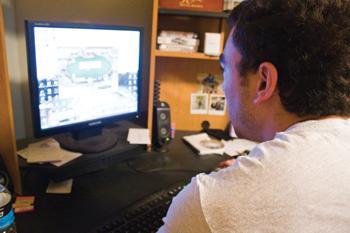Eric Wilderotter leaned forward and rested his chin on his fist. He stared at his computer screen intently while his dog Deuce slept by his feet. Pixelated images flashed across the screen – numbers and figures draped in red and black. Three, seven, Jack, Queen, King. Wilderotter was spending another Monday afternoon playing online poker. But this game was once more than just a hobby for the accounting senior – it was his job for 2 1/2 years. With the ever-increasing popularity of poker on TV, it comes as no surprise that many college students use the classic card game as an alternative means to make money.
PLAYING THE SITUATION Wilderotter raked in a weekly sum of $250 playing poker on the Internet. He said he played about 25 hours each week until the Web site he used shut down. Wilderotter now bartends at Juban’s Restaurant, where he said he makes about the same amount of money. He said he still plays online poker about 12 hours each week. But Wilderotter said he never lost more money than he could afford. “The one thing I do very well is money management,” he said. “I never ever bet more than I can afford to lose. I always had enough money that if I lost, I would still be OK. The best thing about my poker playing is I always play within my limits.” Wilderotter said playing poker online is a different experience from playing live games. “Poker is a game of incomplete information, so the more you get, the better you’re off,” he said. “Online is a lot more mechanical. You don’t really play the player online as much as you play the situation.”
IN THE MONEY The profits TJ Stokes makes during a round of poker with his buddies is nothing compared to what he will be competing for in June. The industrial engineering junior will travel to Las Vegas where he will be one of thousands of poker aficionados competing in the World Series of Poker. The event’s cash prizes attract the world’s top poker players each year. “I love the game, and the risk factor is a semi-adrenaline rush,” Stokes said. Stokes has about a year until he graduates from the University, but said if he wins big in Las Vegas this summer, those plans may change. He said if he wins a bracelet – the poker tournament’s equivalent of a gold medal – the payout could add up to more than $350,000. “The shot of me winning is a very long shot,” he said. “Even with skill, there’s luck involved, especially in a big tournament like that. But I would probably quit school and play poker all the time, so [my girlfriend is] not too happy about that.”APPLES AND ORANGES A little more than just two letters separate “gambling” from “gaming.” “Gambling in Louisiana is against the law,” said Joseph Brantley, attorney at Brantley and Associates. “However, for the state’s economic development, the Louisiana Legislature defined certain licensed activities as gaming.” Some of these activities include off-track betting facilities with poker machines, riverboat casinos, parimutuel betting at racetracks and charitable gaming like Bingo. “It’s like calling an apple an orange,” Brantley said. Online gambling is considered illegal by both federal and state law, but private poker games are legal as long as the facility does not charge for participation or receive compensation for hosting the event.
MIND GAMES What may seem to many college students like a simple game of cards is an art for professional poker players. Instead of brush strokes and complimentary hues, poker players look for physical signs of bluffing or signals indicating good hands. Players can say everything about their cards with the blink of an eye, but silence also speaks volumes. Stokes said he does not use any tactics to throw off his opponents during a game, and he can easily read his friends’ faces when they attempt to bluff. “It all varies from person to person,” he said. “In order to really read a person well, you have to play with them for at least a small extended period of time because there’s a lot of people out there who have read the books that will give you false tips just to screw with you.” BJ Lato, construction management sophomore, said the psychology element of poker is what he loves about the game. “Just the skill it takes to read somebody is great,” he said. “It varies, but sometimes people talk really loud or blink a lot when they have a strong hand. But sometimes it’s reverse psychology, and that can really get you.”
LUCKY STRIKE Skill is a necessity in poker, but many players rely on a hint of luck to double their earnings. Some players protect their cards with a lucky poker chip as they wait for other players to bet, but a small ivory elephant comes to Wilderotter’s aid every time he sits down for a game of cards with his friends. “I don’t know if it really gives me luck,” he said. “I don’t bring it into casinos. It’s more just to goof around with friends.” Lato said he does not have a lucky charm for poker games. “One thing I do before a game is try to find a poker game on TV,” he said. “I kind of do what they do sometimes. Sometimes it helps because they give you tips throughout the game.”
—-Contact Angelle Barbazon at abarbazon@lsureveille.com
Students find new way to earn cash in a classic card game
March 11, 2008

Eric Wilderotter, accounting senior, plays a game of poker on his computer as a way to earn extra money while in college.



